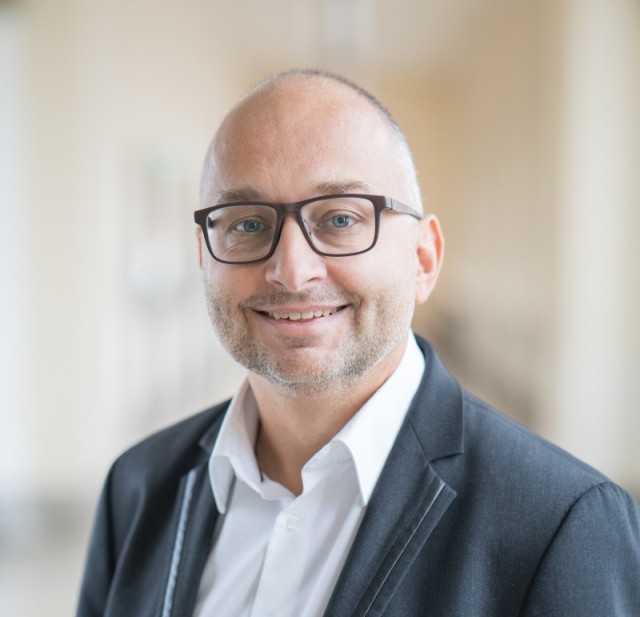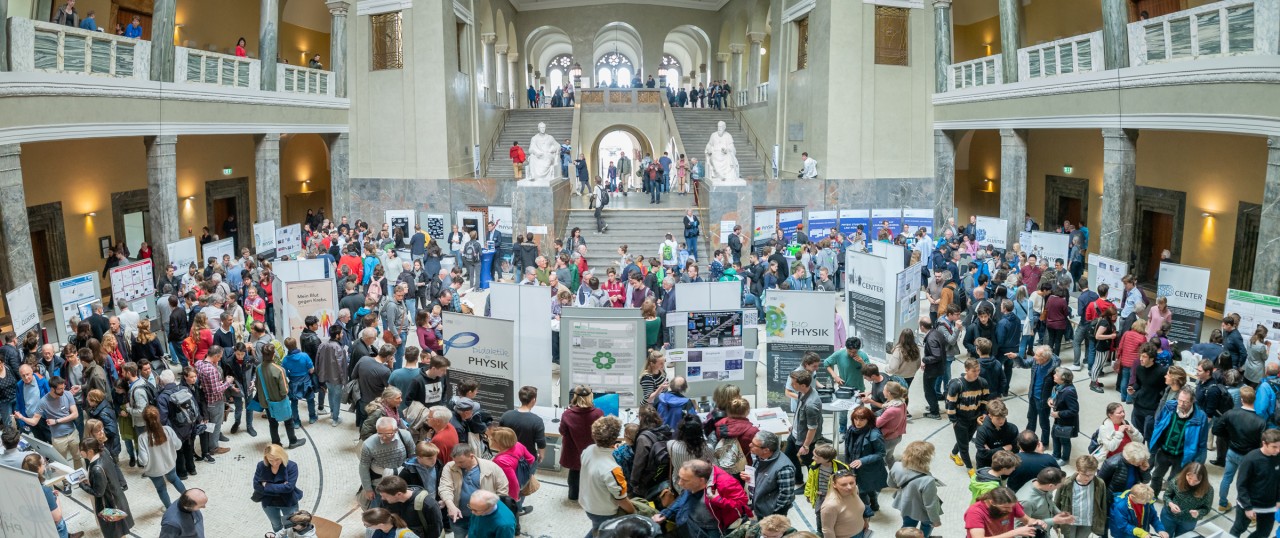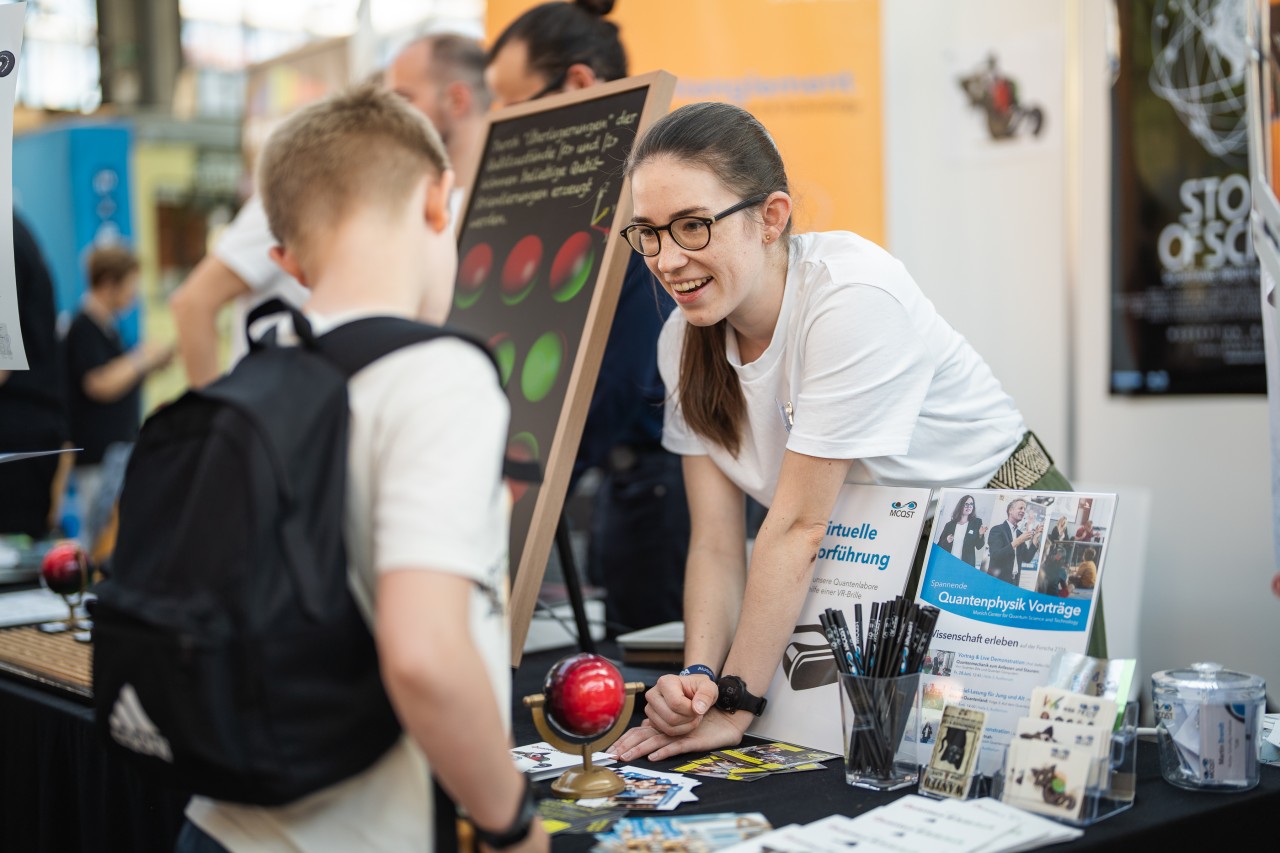5 November 2025
Quantum physics: Discovering the future
The world's coldest computers, tic-tac-toe with quanta, and numerous hands-on experiments: The United Nations has designated 2025 the International Year of Quantum Science and Technology. As part of its initiatives to mark this anniversary, the Faculty of Physics at LMU has organized a Day of Quantum Physics together with the Munich Center for Quantum Science and Technology (MCQST). Taking place this Saturday, 8 November 2025, the program features numerous lectures and interactive stations at LMU’s Main Building, where visitors can discover the fascinating world of quantum physics and cutting-edge quantum technologies.
„Physics opens its doors to the next generation of curious minds. With the Day of Quantum Physics, we aim to inspire pupils and students with the fascinating world of the smallest particles and show them how exciting, creative, and forward-looking research at LMU can be. Innovative teaching formats, interactive experiments, and new technologies demonstrate that physics is not just a science of formulas — it’s a journey of discovery, and we invite as many young people as possible to embark on that journey with us", says Prof. Jochen Kuhn, Vice President for Innovation in Education and Teacher Training at LMU.
 © C. Hohmann (LMU)
© C. Hohmann (LMU)
The Faculty of Physics is organizing a Day of Quantum Physics at LMU together with the MCQST cluster of excellence. What makes this topic so important?
Ulrich Schollwöck: The topic is very important in multiple respects. Firstly, we’re celebrating a century of quantum physics – one hundred years ago, Werner Heisenberg and Erwin Schrödinger laid down the foundations of quantum mechanics in their current form. This is also of historical significance for us at LMU, as key figures like Heisenberg and Wolfgang Pauli were here at the university and were taught by the great theoretician Arnold Sommerfeld. And secondly, we’re now able to exploit the complexity of quantum mechanics for practical applications like quantum computers and quantum communication.
So quantum physics remains a key topic for physics at LMU today?
Precisely, and it involves a huge range of research areas. One example is quantum simulators, which are sort of like analog quantum computers. This field was born in Munich in 2002 with the experiments of Immanuel Bloch’s research group on the third floor here in Schellingstraße. And now scientists all over the world use quantum simulation.
We’re also very well positioned in theoretical physics. We propose new experiments for the quantum simulators, accompany them with theoretical work, and develop algorithms which can be computed numerically in order to better understand complex quantum mechanical systems. Moreover, we’re deeply engaged in the areas of quantum communication and cryptography. And the list goes on and on.
The prospect of quantum computing excites a lot of people. What makes it so appealing, do you think?
I work in the field of theoretical physics. From my perspective, the special appeal is that we’re genuinely dealing with a whole new paradigm in information processing. It’s a different way of thinking about information, with brand new opportunities, but also new challenges. It throws up fundamental questions. To tackle them, we’ve just established a new Chair of Quantum Information Theory with Professor Michael Walter.
Irrespective of how well a quantum computer will work one day, we can expect there to be numerous practical applications for the accompanying innovations, due to the huge technical challenges that have to be mastered. The big question at present is whether we can successfully scale up the first small quantum computers, which are already in existence, to a size where they actually outperform classical computers. And whether we subsequently manage to develop further quantum algorithms – computer programs in effect – that run on these quantum computers and master applications that benefit us all.

What else does quantum physics have to offer with regard to basic research and applications beyond quantum computers?
Well, quantum simulators are also interesting as systems for directly addressing basic research questions in the fields of solid-state physics and material physics. Scientists can investigate and modify specific parameters and properties of materials and thus explore how a solid body would behave if it had other properties at the microscopic level.
In the field of quantum sensors, we can also systematically probe limits like the Heisenberg uncertainty principle and try out things that were previously inconceivable.
Quantum technologies in everyday life
How optimistic are you that the general public will have novel quantum technologies in their everyday lives before long?
I’m very bullish, and not just from professional bias, but because it’s actually becoming apparent that there are a whole load of application possibilities which we wouldn’t have even dared to dream of a few short years ago. An example that relates to LMU is secure quantum communication, which requires the exchange of quantum keys. We already have the world’s longest quantum network at LMU, between downtown Munich and Garching.
But if we really want to encompass the globe, we need a large network of satellites. China has led the way here, having launched quantum communication satellites into orbit for demonstration purposes several years ago. However, these satellites were pretty large, expensive, and not especially practical. LMU physicist Harald Weinfurter worked with colleagues all over Germany to develop QUBE, a satellite the size of a shoebox which does exactly the same. These miniature satellites can then be launched into space in large numbers at low cost. This has brought the idea of a quantum network in space a big step closer to realization. So we’re making progress for sure.
Across the entire discipline, there’s a real spirit of optimism. To what extent are LMU and the MCQST cluster of excellence contributing to this mood?
With MCQST, Munich Quantum Valley, the two universities LMU and TUM, and the Max Planck Institute of Quantum Optics, Munich is already seen abroad as the strongest quantum location in Germany. We’ve got the highest concentration of cutting-edge quantum research here.

Convey a spirit of optimism
At the Day of Quantum Physics at LMU, you want to convey something of this spirit of optimism, with many events geared toward young people in particular. How are you seeking to inspire schoolchildren to become interested in quantum physics?
We’re trying to do this at all possible levels – after all, the people who come to us have widely different interests. As such, our offerings range from experimental demonstrations and lab visits to more theoretically oriented lectures – some of a general nature; others more specialized – so that we cater to the widest possible spectrum of interests and levels of prior knowledge.
What are the highlights of the day in your view?
We’ve managed to cover the full breadth of quantum physics with our speakers. We have a brilliant opening speaker in Harald Lesch, who is a truly gifted physics communicator.
Then there is Immanuel Bloch, one of the real pioneers and international luminaries in this sphere – and an outstanding speaker to boot. He will be giving an excellent lecture, which I will be sure to catch. I’m also very excited to hear what LMU physicist Johannes Zeiher has to say about digital quantum computers based on ultracold atoms. He and his company planqc have just received the German Entrepreneur Award, which shows the transition we’re making from basic research to applications.
And I want to take a look at the experiments. Quantum physics is very abstract after all, so the challenge of devising experiments to make it halfway comprehensible is daunting. But this is just a tiny selection from an extensive program.

New approaches to teaching
As you just indicated, quantum physics is not exactly easy to communicate. What new approaches are you taking in this regard at LMU and with MCQST?
Within the MCQST cluster of excellence, we want to take up a project by Jochen Kuhn, who has not become our new Vice President for Innovation in Education and Teacher Training for nothing. We have some really nice ideas here for taking the didactic concept he’s already implemented in classical mechanics, and combining it with artificial intelligence and augmented reality in order to explain quantum mechanics. It has an interactive element: Based on the reaction of the listener or schoolchild, as measured by eye movements for instance, it’s possible to choose the further explanation pathways and revisit certain points, and thus find the appropriate level of explanation for each individual.
Then there’s the PhotonLab for schoolchildren at the Max Planck Institute of Quantum Optics, which welcomes thousands upon thousands of youngsters through its doors every year. Always booked out far in advance, it’s a huge success story for science communication. In addition, we jointly developed the special exhibition “Light and Matter” with the Deutsches Museum, which will become part of the permanent collection in 2028.
When you look back on the initiatives that have taken place at LMU thus far for the Year of Quantum Science, what is your overall verdict?
To date, everything has gone very well indeed. Our “Modern Physics” lecture series, which covered the full scope of quantum physics, was very well attended. These lectures were somewhat more specialist in orientation. In contrast, our Day of Quantum Physics on 8 November is geared toward a broader public. It is clearly the highlight of our calendar of events, because we’re trying to reach everyone in the audience and present the full scope of quantum physics in one place.
Article orginally prublished on the
LMU website. Written by Hubert Filser.
Program
At 11:00 a.m. the Dean of the Faculty of Physics, Prof. Ulrich Schollwöck, will open proceedings in the Audimax lecture theater. This will be followed by lectures by Prof. Harald Lesch and Prof. Immanuel Bloch. For their part, LMU professors Fabian Grusdt and Monika Aidelsburger will be explaining how scientists coordinate theory and experiment in the highly promising field of quantum simulation.
Visitors can discover the world of quantum physics in the atrium of the LMU Main Building: research groups will be presenting their work at booths and interactive stations, and there will be talks for schoolchildren. A small exhibition on the Dean’s Corridor in the Main Building will focus on key figures in the history of quantum physics. In addition, there will be interactive offerings by the Munich Center for Quantum Science and Technology (MCQST) and various partners, including Munich Quantum Valley, PhotonLab, GALaQSci, and Quanten(t)räume. Students will also be on hand to tell curious visitors what (quantum) physics studies are like at LMU. Guided tours of laboratories and a separate area for hands-on experiments will round off the program. The goal is to provide exciting insights into everyday research.